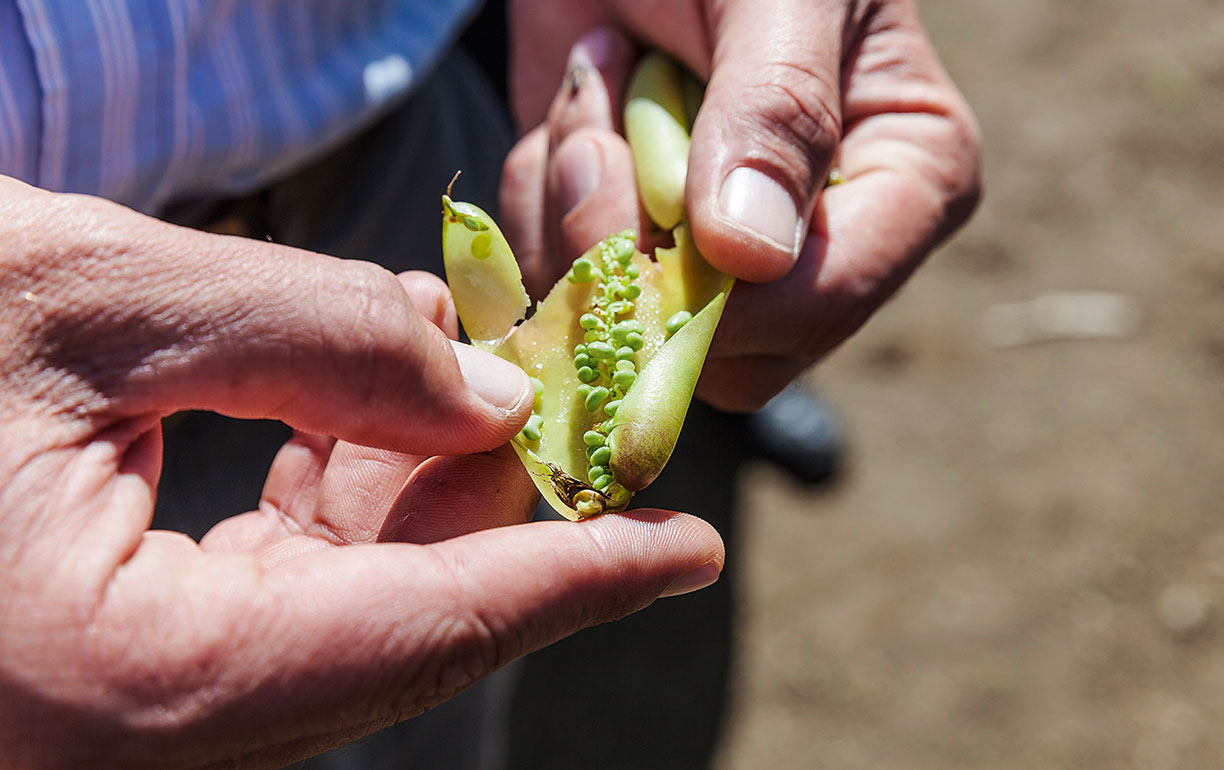
A vital job.
A mild climate, fertile land: excellent vegetables grow in Kenya. The country’s biggest exporter is Vegpro. Lufthansa Cargo ensures that the beans, broccoli and courgette from the company’s farms are crisp and fresh when they reach consumers all over the world.
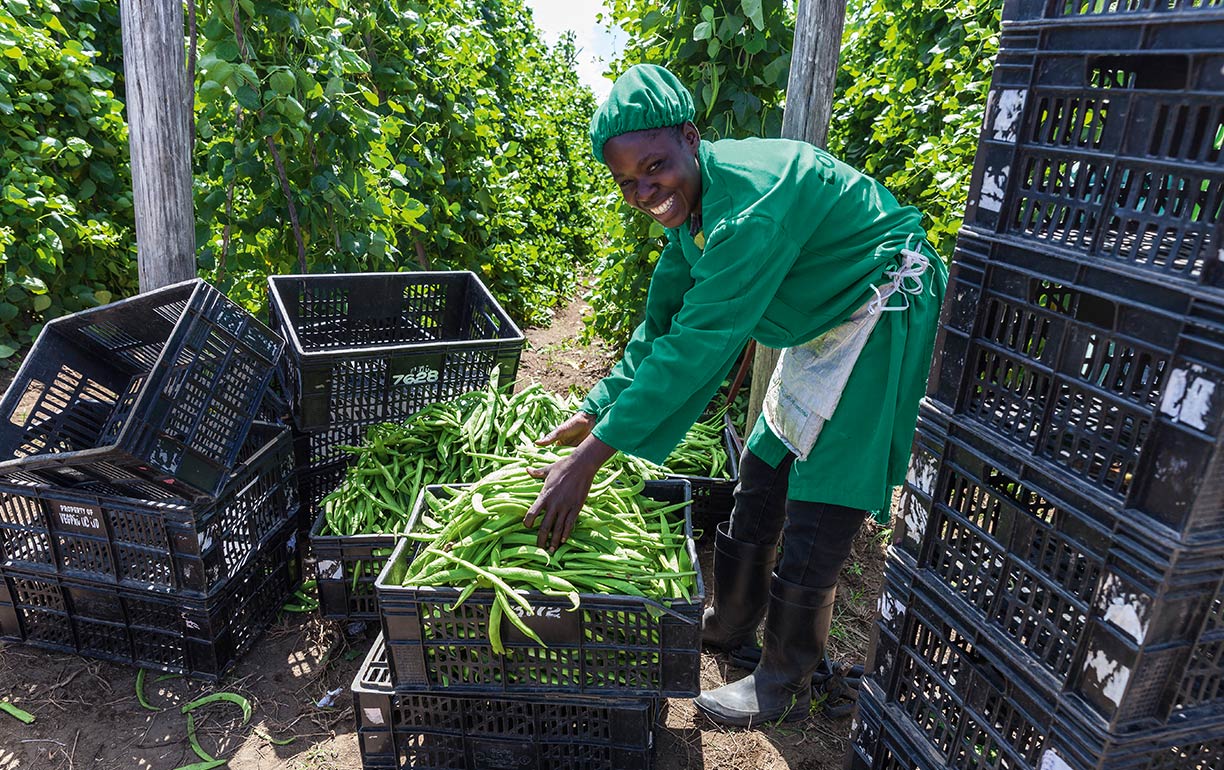
Vegetable cultivation at Lake Naivasha:
The 350-hectare Gorge Farm is located in the southwest of Kenya – only 100 kilometers from the capital and airfreight hub Nairobi.
250 Tons.
That is how many vegetables Vegpro exports as airfreight in a high-yielding week.
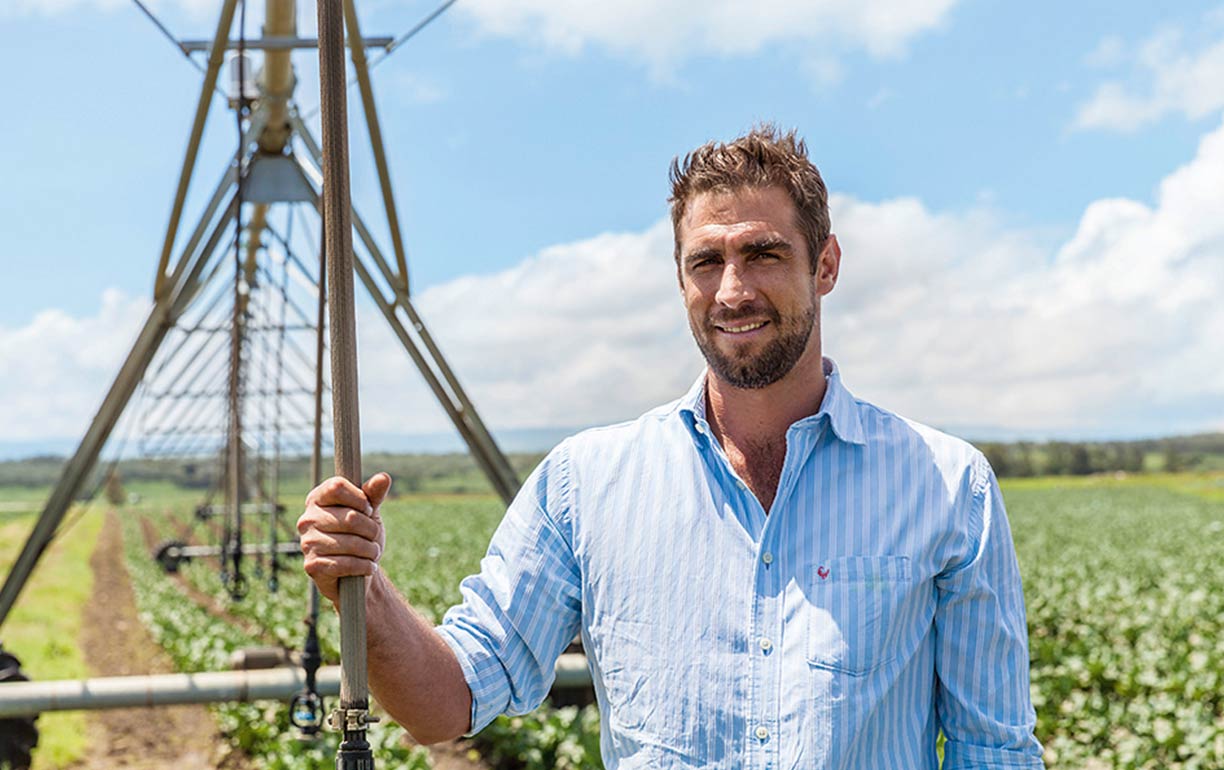
Flexibility is a big asset:
Gareth Wilkie is General Manager of Vegpro Food Farms – the Gorge Farm has 1,200 employees and is one of six farms owned by Vegpro.
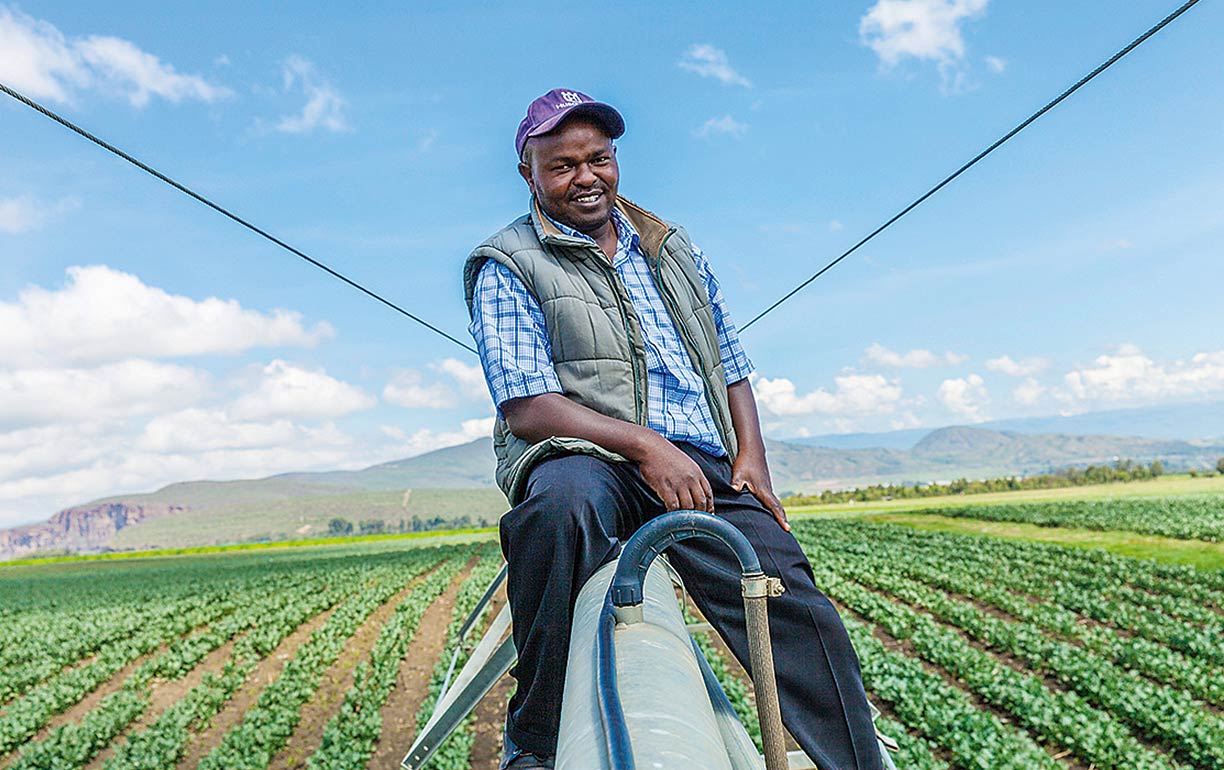
At home in the field:
Charles Maina has been working on Gorge Farm for 17 years – so it is hardly surprising that the farm has long since become more than a workplace for the Kenyan.
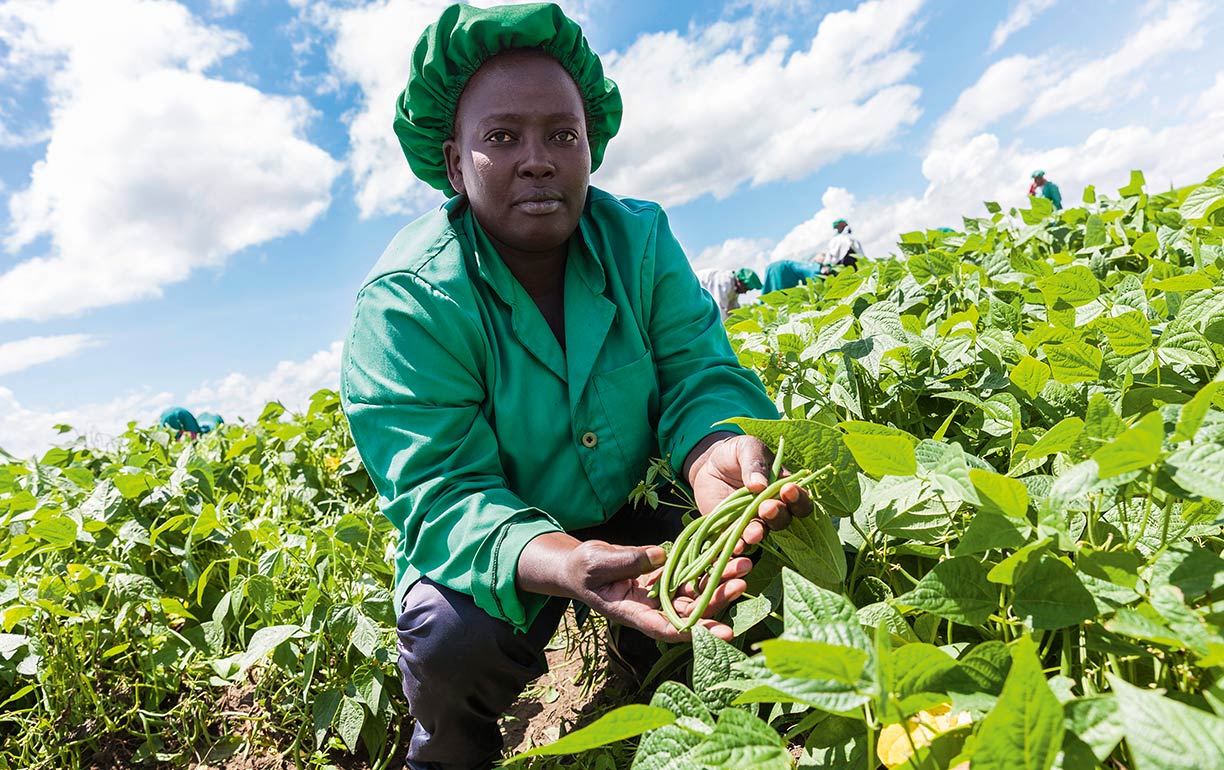
Mild climate and rich harvests.
Freshness you can feel: Vegpro’s export products include beans. The main harvests are during the European winter.
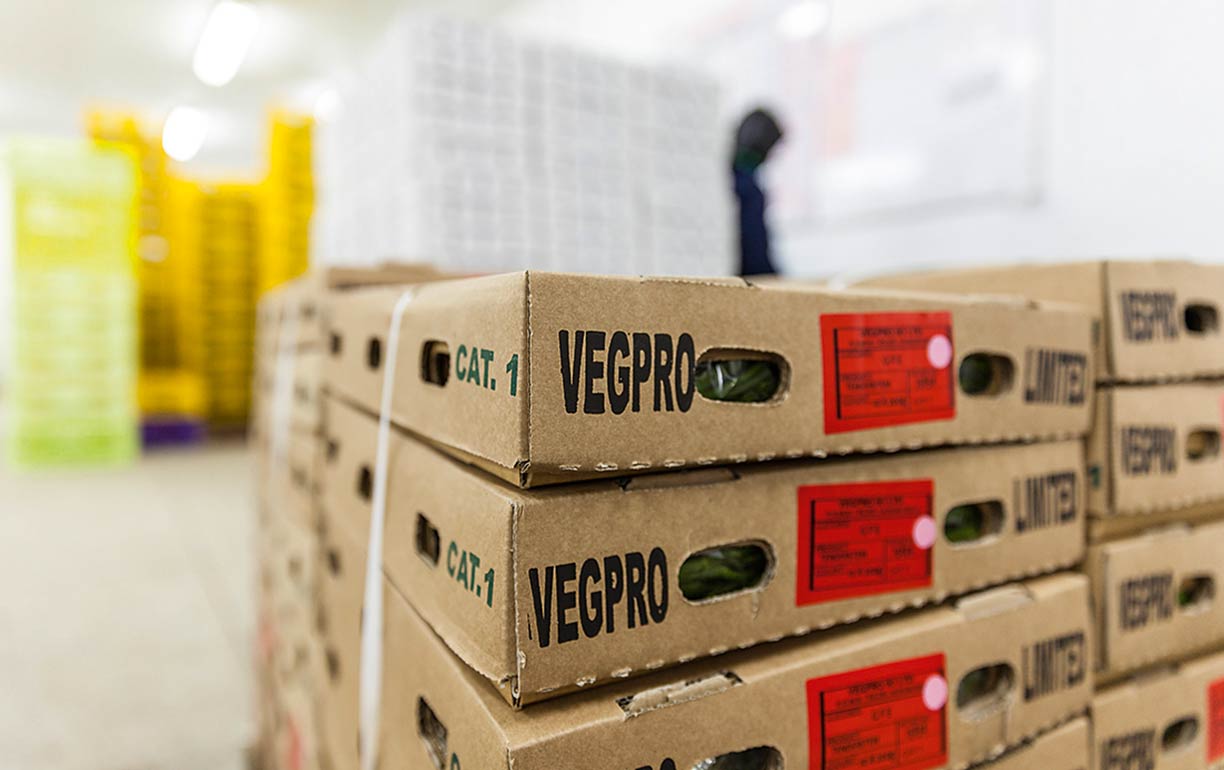
Ready for take-off:
Airfreight is indispensable for Kenya’s vegetable exporters – particularly in the case of the products that are cut and packaged in bite-size portions.
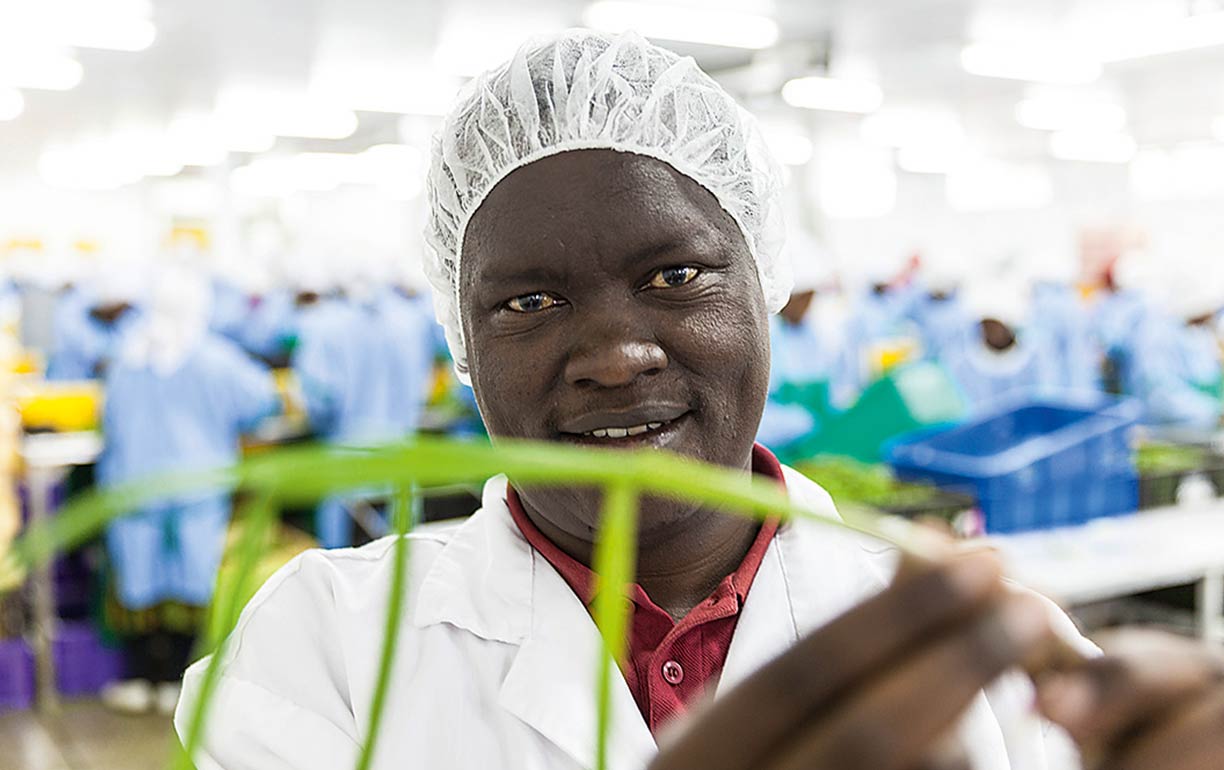
Hygiene is crucial:
Operations Manager Edward Karanu only enters the halls in which the vegetables are processed wearing a cap and dustcoat.
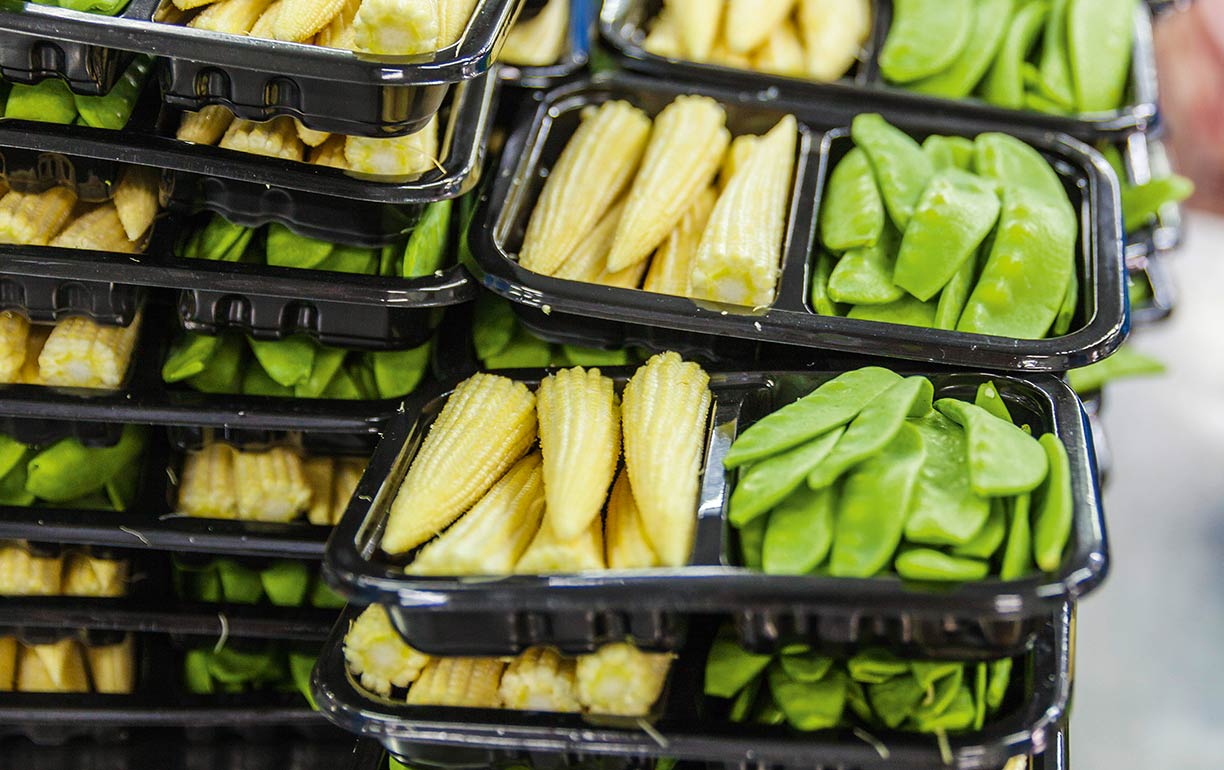
“Freshness is our core-competence. Our products must reach their destinations all over the world as quickly as possible.”
Edward Karanu, Operations Manager, Vegpro
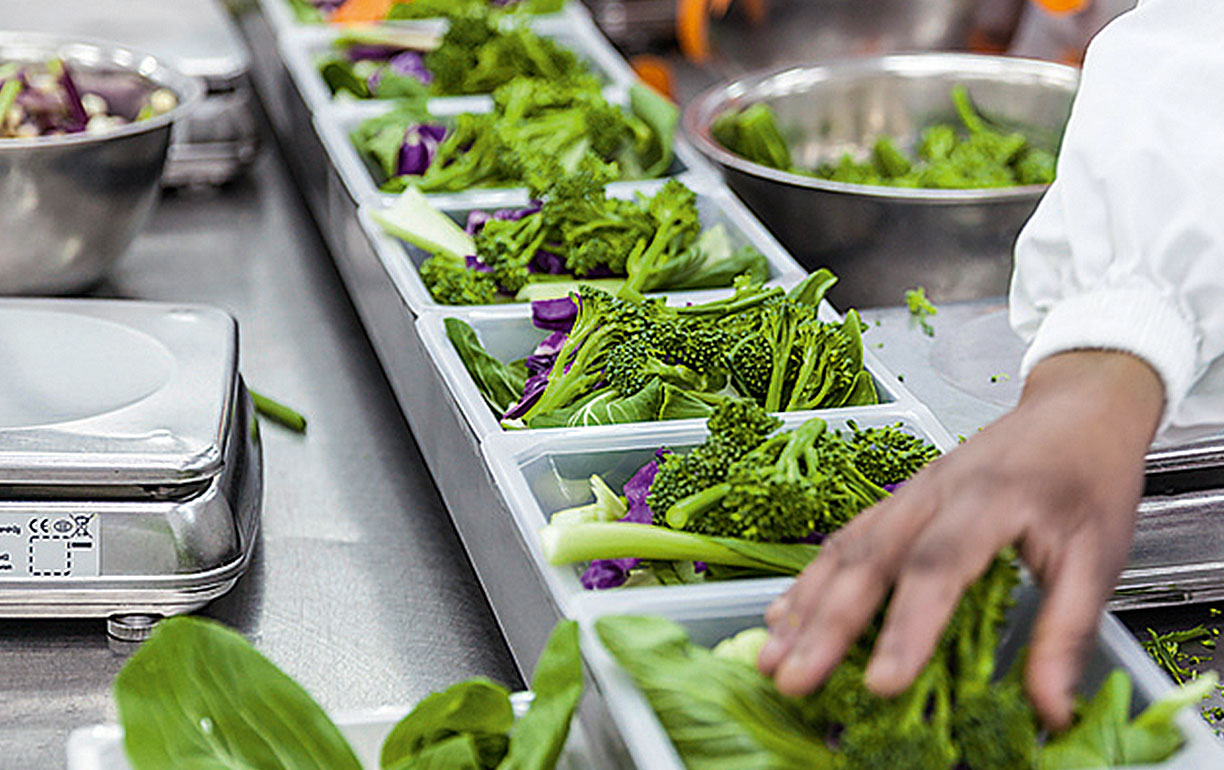
Part of the harvest is processed immediately. Strict controls and established processes ensure the freshness and quality of the goods at their destination.
Charles Maina is proud of his “home.”
Even from high up he finds it hard to view the entire 350-hectare site. It runs from the entrance to the “Hell’s Gate” National Park to Lake Naivasha in the southwest of Kenya. Fertile land as far as the eye can see. Land on which vegetables are grown: broccoli, spring onions, asparagus, cauliflower, courgette and beans.
Charles Maina works as Production Manager for Kenya’s largest vegetable producer and exporter Vegpro Limited. The land that he calls his home after 17 years with the company is Gorge Farm. The company’s largest farm with its 1,200 or so employees is also one of the biggest in Kenya. Vegpro operates six of its own farms but also manages approximately 1,700 smallholder farms.
This organizational structure gives us and our customers the greatest possible flexibility,”
Gareth Wilkie, General Manager of Vegpro Food Farms, explains at the edge of a field on which beans are being harvested. The temperature in glorious sunshine and with a gentle wind is a pleasant 27 degrees. “If we can’t grow and supply a product here at any particular time, we source it from another farm to ensure that our buyers always receive the goods that they have ordered.”
A particular challenge for farming in Kenya is seasonality. Thanks to the constant mild climate the farms can grow vegetables all year round. When it’s summer in Europe, however, the demand for imported vegetables declines. “Here in Naivasha, for example, we plant around 40 percent less during this period,” says Wilkie. “This is a phase when the soil can recover and we find time to carry out extensive maintenance work.” The climate is also an important factor. As a rule, vegetables in Naivasha require a growing time of about three months until they are harvested.
“But if it rains more than expected, there are growth surges, and we have to take that into consideration,” says Gareth Wilkie. “We cannot make compromises when it comes to quality,” the South African emphasizes. Appearance, taste and texture, all of these aspects have to be right in order to sell the vegetables. They are a classic airfreight product. “Sea freight is not an alternative,” says Edward Karanu. The Operations Manager is responsible for ensuring that packing processes run smoothly in the company’s packhouse in Nairobi.
The packhouse is located directly at the international airport of the Kenyan capital.
“Freshness is our core competence. Our products must reach their destinations all over the world as quickly as possible.” For this reason the company is also certified as a Known Consignor. The goods are controlled and packaged at Vegpro and do not require further checking by the airline. Vegpro bridges the approximately 100 kilometers from the farm in Naivasha to the airport with its own refrigerated trucks. If everything goes to plan, the trucks take about two hours to cover the distance. “Kenya must continue to do even more for its infrastructure,” says Karanu.
Traffic jams are a serious problem in the fresh food business.
“We often have traffic jams causing hour-long delays, especially in the direct catchment area of Nairobi. This is a serious problem in the fresh food business. By using our own trucks we at least have control over this part of the supply chain.”The choice of airline is not arbitrary. “As far as the French and British markets are concerned, we rely heavily on Lufthansa to deliver fresh-to-door cargo,” says Karanu.
“It means I can count on reliability, which is so important.” Its network and quality fully satisfy the requirements, and with Fresh/td there is a product that is customized to the needs of perishable goods. Another strong argument is the close cooperation with the Lufthansa Cargo perishable handling team in Frankfurt, which coordinates onward transport like to-door trucking together with the Perishable Center in Frankfurt. “For us, close contact to our customers is absolutely essential,” explains Ivo Seehann, Lufthansa Cargo General Manager in Nairobi.
This is the only way to precisely coordinate processes and requirements. Edward Karanu: “It helps to know that if something should take a little longer in production on our side, by working together we nevertheless manage to get the goods to the customers punctually.” At the Vegpro location in Nairobi, 2,500 staff make sure that everything goes well. Working on a two-shift basis in air-conditioned packhouses, they ensure that the consumer receives top-quality goods by processing the vegetables in two ways.
The first way.
With the first way, they sort and grade the vegetables in the state they come in from the fields: beans are bagged in loose bundles, runner beans are bunched together in firmer packages, while broccoli is packed either in trays or bags. The consumers therefore wash and cut the vegetables themselves.
The second way.
This is not required with the second method: here, carrots or cabbages are cut into bite-size portions and placed in a biocide wash validated to guarantee food safety from micro-organisms. The consumers then place them directly into a pot or pan. On the entire site, meticulous attention is paid to hygiene. Everyone who works in the packhouses wears dustcoats, hairnets and caps. The intense cleaning of all packhouse areas and equipment is done between working shifts.
One day a week, all work comes to a halt and the packaging facility undergoes a particularly thorough clean. Both Charles Maina and Edward Karanu are proud of their work, or as Karanu puts it: “Eating is living, I make a contribution.” Founded in 1979, Vegpro is still a family-run enterprise. Social responsibility plays an important role. Surplus from production, for example, is not thrown away, but used for employee meals or donated to schools or other institutions.
The Gorge Farm generates energy from waste in the company’s own biomass power plant. “I reckon we’re one of the best teams on the market,” says Karanu. “Solidarity and competence is what makes us stand out from the competition.”
Photos:
Ralf Kreuels
|
Charles Maina is proud of his “home.” Even from high up he finds it hard to view the entire 350-hectare site. It runs from the entrance to the “Hell’s Gate” National Park to Lake Naivasha in the southwest of Kenya. Fertile land as far as the eye can see. Land on which vegetables are grown: broccoli, spring onions, asparagus, cauliflower, courgette and beans. Charles Maina works as Production Manager for Kenya’s largest vegetable producer and exporter Vegpro Limited. The land that he calls his home after 17 years with the company is Gorge Farm. The company’s largest farm with its 1,200 or so employees is also one of the biggest in Kenya. Vegpro operates six of its own farms but also manages approximately 1,700 smallholder farms. This organizational structure gives us and our customers the greatest possible flexibility,” Gareth Wilkie, General Manager of Vegpro Food Farms, explains at the edge of a field on which beans are being harvested. The temperature in glorious sunshine and with a gentle wind is a pleasant 27 degrees. “If we can’t grow and supply a product here at any particular time, we source it from another farm to ensure that our buyers always receive the goods that they have ordered.” A particular challenge for farming in Kenya is seasonality. Thanks to the constant mild climate the farms can grow vegetables all year round. When it’s summer in Europe, however, the demand for imported vegetables declines. “Here in Naivasha, for example, we plant around 40 percent less during this period,” says Wilkie. “This is a phase when the soil can recover and we find time to carry out extensive maintenance work.” The climate is also an important factor. As a rule, vegetables in Naivasha require a growing time of about three months until they are harvested. “But if it rains more than expected, there are growth surges, and we have to take that into consideration,” says Gareth Wilkie. “We cannot make compromises when it comes to quality,” the South African emphasizes. Appearance, taste and texture, all of these aspects have to be right in order to sell the vegetables. They are a classic airfreight product. “Sea freight is not an alternative,” says Edward Karanu. The Operations Manager is responsible for ensuring that packing processes run smoothly in the company’s packhouse in Nairobi. The packhouse is located directly at the international airport of the Kenyan capital. “Freshness is our core competence. Our products must reach their destinations all over the world as quickly as possible.” For this reason the company is also certified as a Known Consignor. The goods are controlled and packaged at Vegpro and do not require further checking by the airline. Vegpro bridges the approximately 100 kilometers from the farm in Naivasha to the airport with its own refrigerated trucks. If everything goes to plan, the trucks take about two hours to cover the distance. “Kenya must continue to do even more for its infrastructure,” says Karanu. |
Traffic jams are a serious problem in the fresh food business. “We often have traffic jams causing hour-long delays, especially in the direct catchment area of Nairobi. This is a serious problem in the fresh food business. By using our own trucks we at least have control over this part of the supply chain.”The choice of airline is not arbitrary. “As far as the French and British markets are concerned, we rely heavily on Lufthansa to deliver fresh-to-door cargo,” says Karanu. “It means I can count on reliability, which is so important.” Its network and quality fully satisfy the requirements, and with Fresh/td there is a product that is customized to the needs of perishable goods. Another strong argument is the close cooperation with the Lufthansa Cargo perishable handling team in Frankfurt, which coordinates onward transport like to-door trucking together with the Perishable Center in Frankfurt. “For us, close contact to our customers is absolutely essential,” explains Ivo Seehann, Lufthansa Cargo General Manager in Nairobi. This is the only way to precisely coordinate processes and requirements. Edward Karanu: “It helps to know that if something should take a little longer in production on our side, by working together we nevertheless manage to get the goods to the customers punctually.” At the Vegpro location in Nairobi, 2,500 staff make sure that everything goes well. Working on a two-shift basis in air-conditioned packhouses, they ensure that the consumer receives top-quality goods by processing the vegetables in two ways. The first way. With the first way, they sort and grade the vegetables in the state they come in from the fields: beans are bagged in loose bundles, runner beans are bunched together in firmer packages, while broccoli is packed either in trays or bags. The consumers therefore wash and cut the vegetables themselves. The second way. This is not required with the second method: here, carrots or cabbages are cut into bite-size portions and placed in a biocide wash validated to guarantee food safety from micro-organisms. The consumers then place them directly into a pot or pan. On the entire site, meticulous attention is paid to hygiene. Everyone who works in the packhouses wears dustcoats, hairnets and caps. The intense cleaning of all packhouse areas and equipment is done between working shifts. One day a week, all work comes to a halt and the packaging facility undergoes a particularly thorough clean. Both Charles Maina and Edward Karanu are proud of their work, or as Karanu puts it: “Eating is living, I make a contribution.” Founded in 1979, Vegpro is still a family-run enterprise. Social responsibility plays an important role. Surplus from production, for example, is not thrown away, but used for employee meals or donated to schools or other institutions. The Gorge Farm generates energy from waste in the company’s own biomass power plant. “I reckon we’re one of the best teams on the market,” says Karanu. “Solidarity and competence is what makes us stand out from the competition.” |
Photos:
Ralf Kreuels
